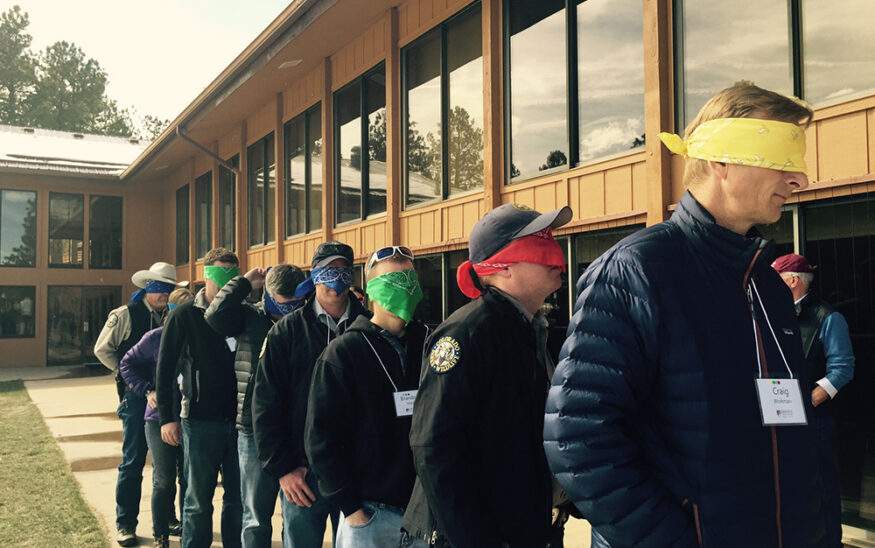Workshops not working? No time for a graduate degree?
Customized executive education grows to fill the gap
Suzie Romig //March 8, 2017//


Workshops not working? No time for a graduate degree?
Customized executive education grows to fill the gap
Suzie Romig //March 8, 2017//

Leaders at Colorado Parks and Wildlife faced a triad of organizational challenges in recent years, including migration through a state-mandated merger, a covey of impending retirements, and challenges between a more urbanized Colorado citizenry and wildlife.
Employees working in the state division needed effective leadership development training while still accomplishing their work out in the field. CPW Director Bob Broscheid sought a university-level customized education solution – a growing trend in executive education.
The University of Denver's Daniels College of Business created a personalized class for Parks and Wildlife through the college's executive and professional program and the class was so successful that CPW is selecting its fourth annual cohort of 30 students through a competitive process.
"It's succession planning at its finest, and it's preparing [them] to be better leaders, but also better mentors, supervisors and coaches," Broscheid says of DU's custom program.
So far, 90 CPW employees have graduated from the combined in-person and online 10-month course, 54 of them current supervisors and 36 non-supervisors. Of the students, 25 percent later earned promotions, Broscheid says, noting the training led to better organizational decision-making and though processes at CPW.
READ MORE: Learning by doing and other career-readiness strategies
"Morale within the agency is improving because of this," the director says. "More robust decision-making leads to cost savings, better efficiency and better public engagement."
Customized learning programs are delivered in a variety of lengths and formats to fit the needs of businesses and nonprofits. Clients range from police departments to food bank staffers and corporate customers, such as Level 3 Communications, Arrow Electronics and Comcast.

The university options are offered through adaptations of college business programs or the formation of new nonprofit entities within higher-ed settings. Classes can run from one week to 18 months and cost from $5,000 to $100,000 or more.
"We listen to the needs of our clients to identify pain points, growth opportunities and operational needs that can be solved or assessed by experts and resources that are avilable at CSU," says Arthur Sintas, director of ASCEND at Colorado State University in Fort Collins. "All our services are based on their unique needs."
The distinguishing factor of the customized options is that the classes reach a deeper level than half- or day-long public workshops, but take less time and financial commitment than advanced degrees.
While bringing in new sources of revenue for Colorado universities, the expanding education options also save organizations money by working to solve real business and structural issues. Employees experience introspective training and utilize the trusted in-state expertise of university adjunct or tenure-track faculty.
"This is a good investment in efficiency and productivity," Broscheid says. "This program is changing people's lives, not just creating better employees, but people are going home and becoming better people in the community."
In customized education, business leaders tell university directors what they need, unrestricted by course catalogs or multi-year degree programs. At the same time, businesses gain strong employee recruitment and retention benefits and likely end up with operational cost savings.
"Our clients are working on real problems, so when the custom work is organized correctly, the program pays for itself 10 times over," says Kevin Cuthbert, associate dean of executive and professional programs at DU.
A uniquely tailored program might start with a three-day teambuilding or action-learning experience in the mountains – ranging from ropes courses to scavenger hunts – then progress to a half-day seminar each month on the university campus for the next 12 months. Or perhaps the structure is three days on campus followed by a six-week break with homework, then three days at the company.
Cuthbert says about 75 percent of the custom education programs from DU focus on leadership, while 25 percent deal with more technical topics such as:
- Strategic finance
- Accounting
- Marketing
- Analytics
Sintas at CSU says the top five areas requested for services include:
- Employee engagement
- Organizational climate assessments
- Marketing and branding
- Recruiting
- Strategic planning
University leaders say they see modest growth in MBA degree programs and public workshops, but the biggest growth is in these custom programs.
"All things being equal," Cuthbert says, "there is a trend toward more specific programs that speak directly to a company's situation."

Top Recommendation for Business Schools
Adapt to compete with professional service firms "or be relegated to finding revenue from the shrinking markets of more traditional, standardized learning for one- to five-day training and degree programs." – Executive Core LLC national marketing trends summer 2015






















